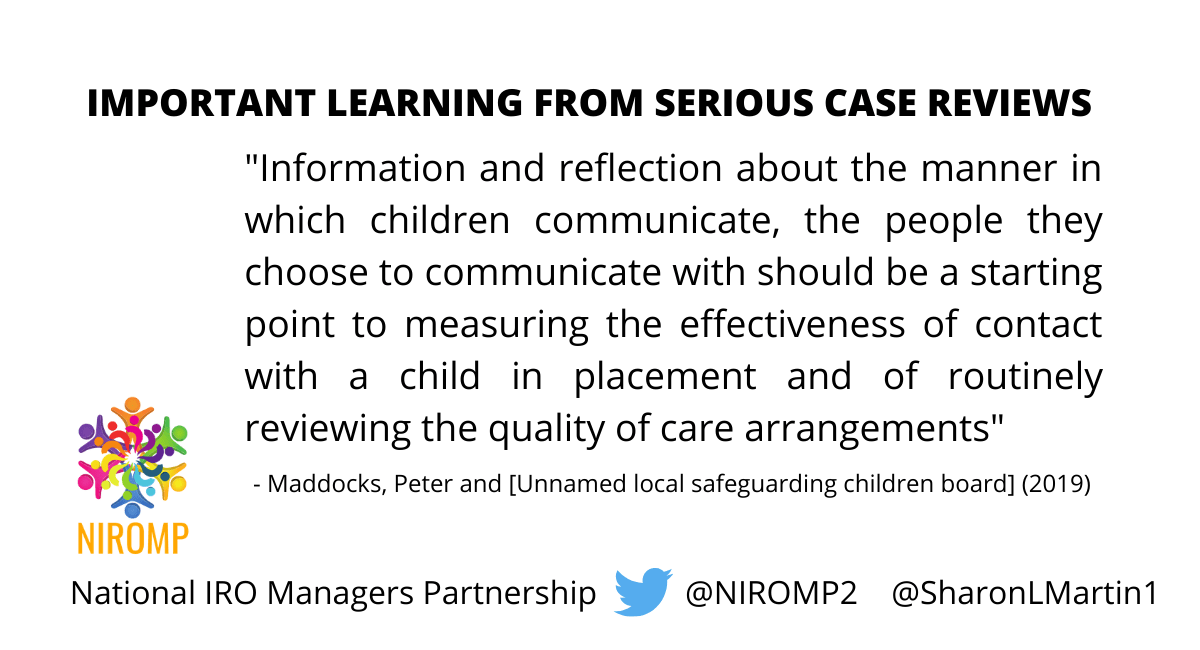serious case review ‘Grace, lisa and carery’
Abstract: Sexual abuse of three girls by their male foster carer. The victims, Grace, Lisa and Carey provided evidence to convict the perpetrator, who was sentenced to 9 years imprisonment. Perpetrator and his wife were approved foster carers from 1998 until their deregistration in December 2014. They had 38 children placed with them; 28 were placed prior to 2011. Grace made several disclosures from 2011 but no action was taken. She was contacted by police investigating disclosures by Lisa and Carey in 2014.
Learning includes:
- Ensuring that children are asked for their views, wishes and feelings independent of their carer.
- Information and reflection about the manner in which children communicate, the people they choose to communicate with should be a starting point to measuring the effectiveness of contact with a child in placement and of routinely reviewing the quality of care arrangements.
- Ensuring that their social workers are required to provide information for the foster carer review.
- Maintaining a chronology of concerns or issues raised in regard to the carer.
- Assessing the carers attitudes to training and personal development.
- Assessing the extent to which they can demonstrate appropriate empathy and understanding about the behaviour and needs of children.
- Children who are placed away from their families face additional vulnerability.
Giving children regular and independent access to people outside of their care
placement and independent from their carers is essential. - The supervision of foster carers needs to be robust. Where relationships have
developed over several years between carers and social workers and other
professionals, children who have concerns or are being abused will feel even more
that they are unlikely to be believed or taken seriously. - Foster carers who have well-established and long relationships with people such as social workers and teaching staff will undermine a child’s confidence in talking with anybody about sexual abuse or other maltreatment by that those foster carers.
- Role of local authority designated officer (LADO) has a significant role in regard to any criminal investigation, enquiries and assessment as to whether a child or children are at risk or in need of services.
- Widely promoting the purpose and role of the LADO is important and goes wider than the work of carers and professionals working directly with the local authority and encompasses for example volunteer organisations and activities; clear understanding by health professionals, teachers and learning mentors, criminal justice and legal practitioners as well as more widely across the community. In dealing with sexual abuse, the LADO can play a vital role in collating intelligence that on its own has little significance but can begin a process of joining up different elements of evidence and concern.
serious case review ‘gEORGIA’
Abstract: Life-threatening self harm of a 15-year-old girl in May 2019. Georgia was admitted to hospital following a serious and life-threatening overdose. Georgia was subject to child protection plan in both parents’ care, and later her mother’s care. Taken into care in 2018; no contact with father for 10 years but court ordered assessment regarding Georgia’s wish to have contact. Episodes of going missing, using cannabis, and alcohol misuse. Concerns about risk of exploitation. Georgia was in foster care at the time of the incident but was staying with her father and his partner as planned contact. Georgia refused to return to her placement; made allegations about a visitor to the foster home. Delays in Georgia being formally interviewed about allegation, with her ultimately refusing. Three incidents at father’s home: overdose and attempt to self-harm; allegation of physical assault by father; serious and life-threatening overdose.
The learning includes:
- Independent Reviewing Officers (IROs) must focus on a child, regardless of the pressures that professionals working with the child are experiencing.
- Professionals in partner agencies should use appropriate formal processes to challenge other professionals if they are concerned about the plan for a child, or do not receive information that is required.
- Foster carers require training that is trauma informed; when a child in care moves area it is important for all professionals to share information and for key professionals to speak to their equivalents in the new area;Ethnicity and nationality not stated.

